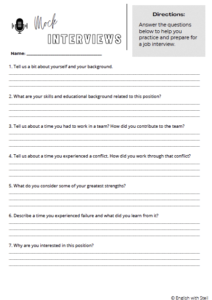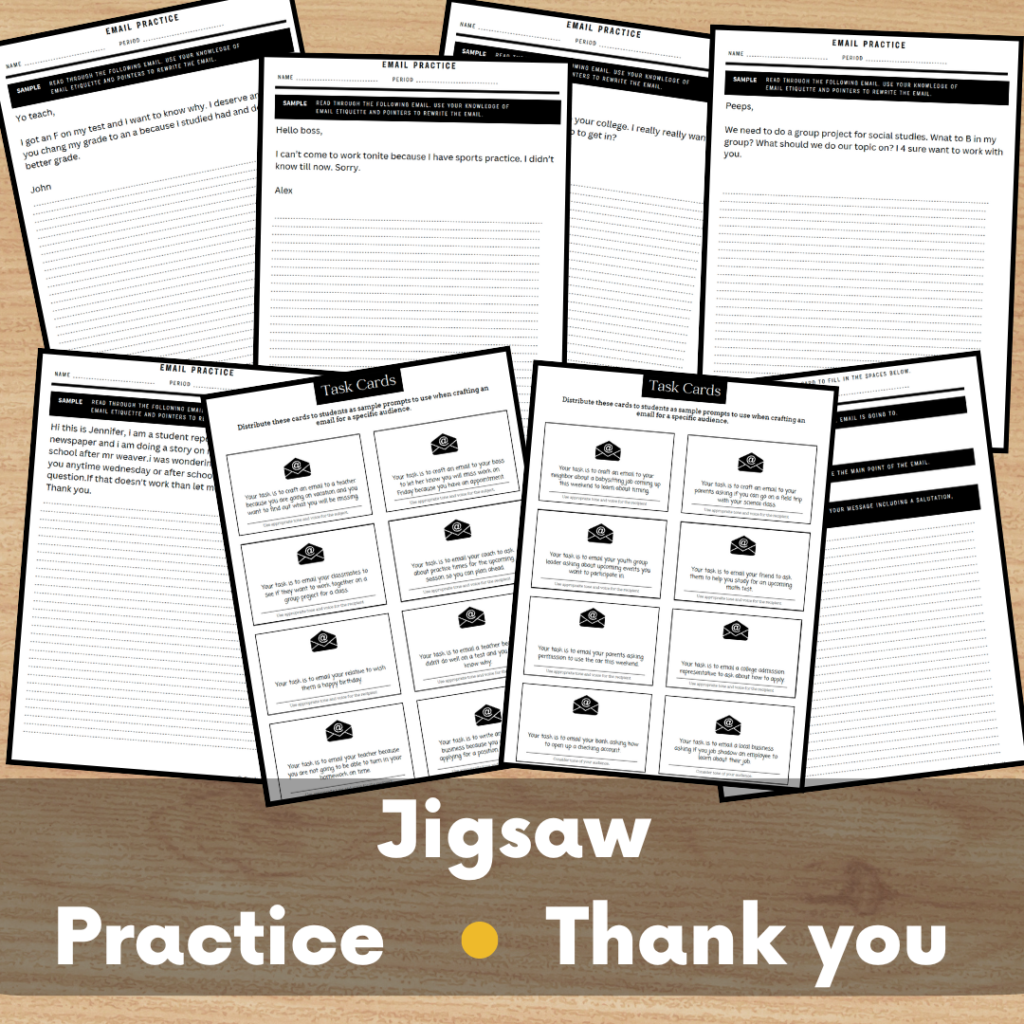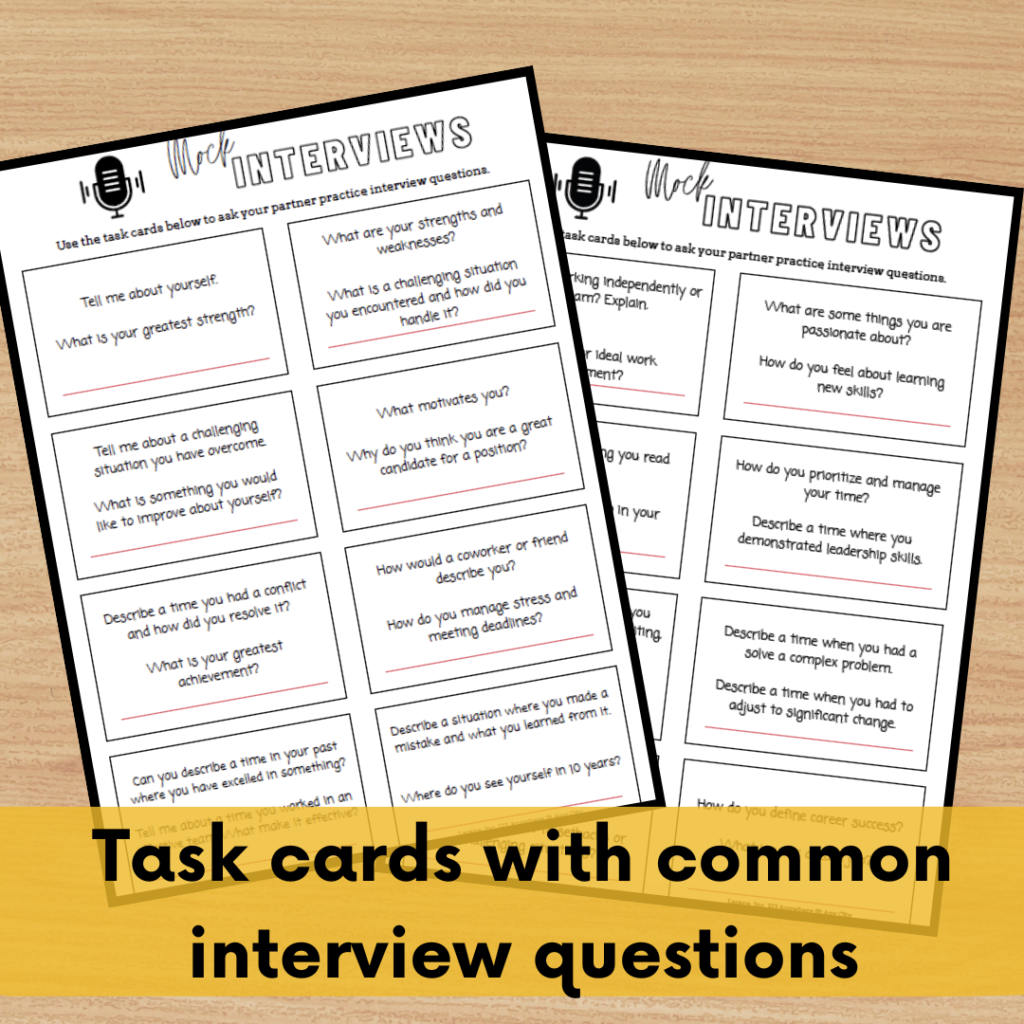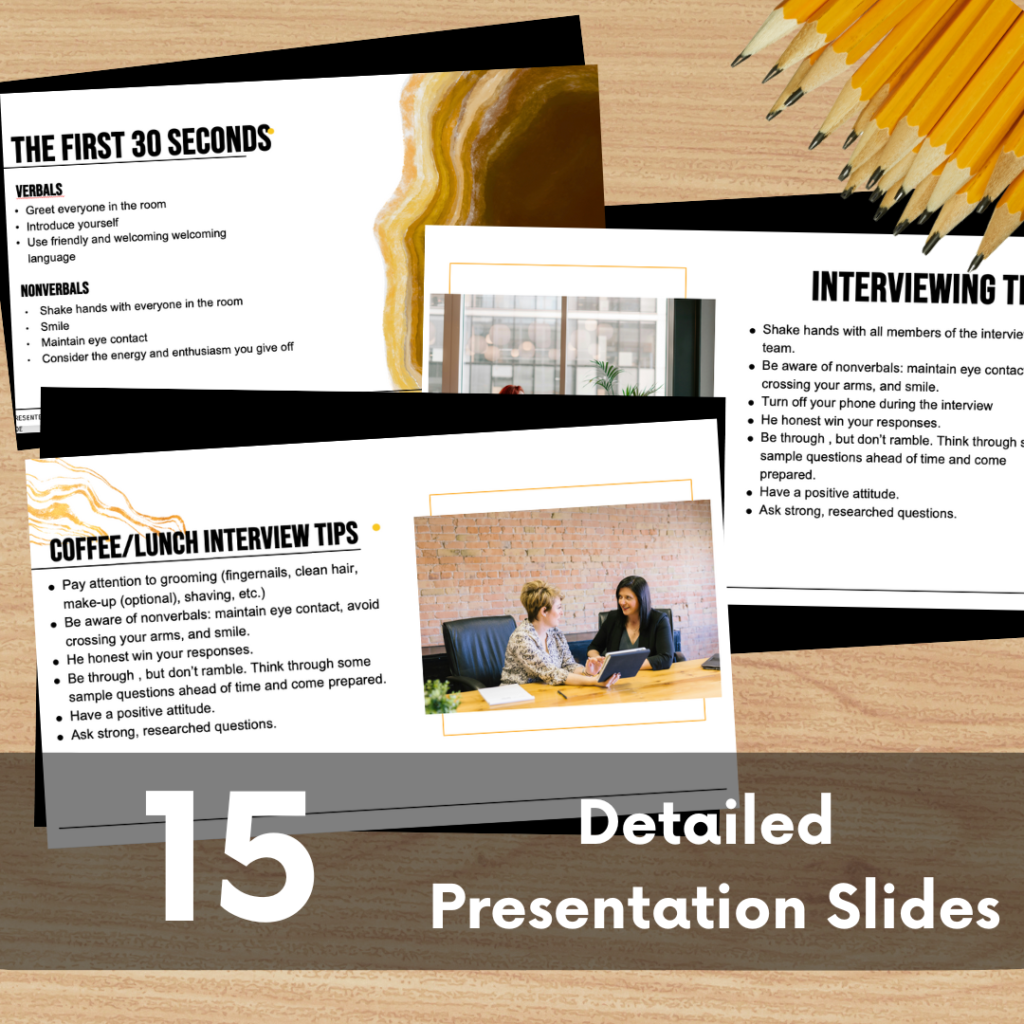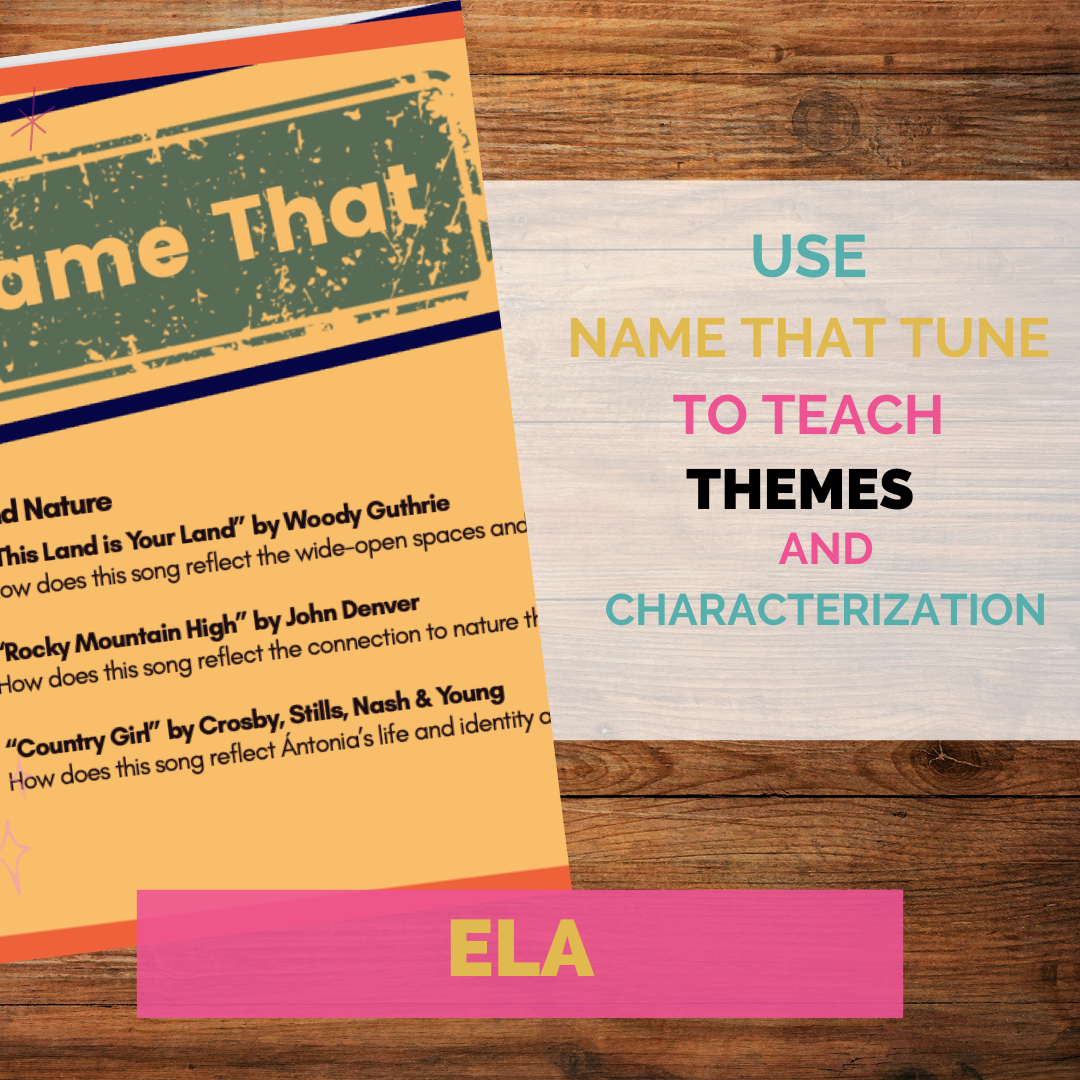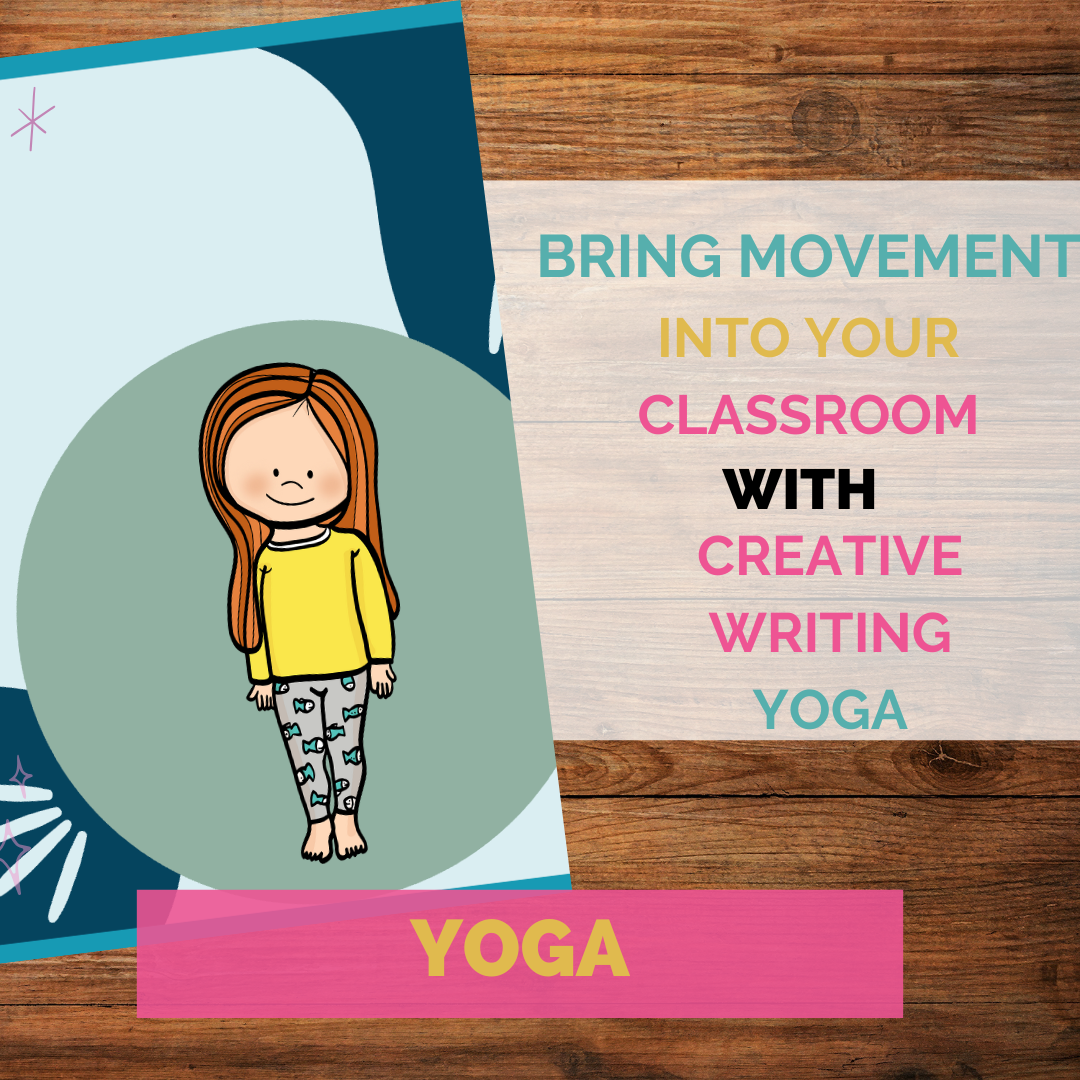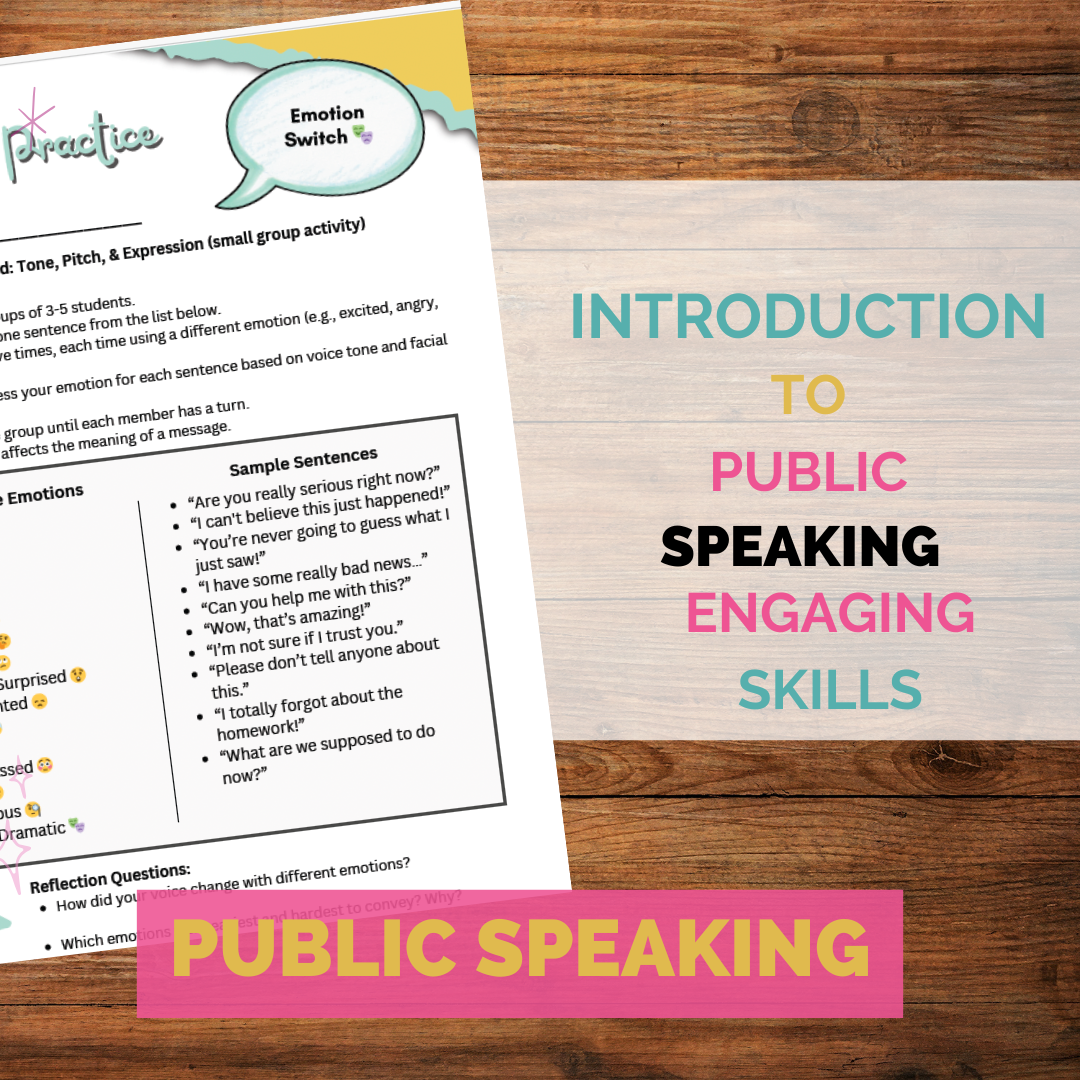Help your students prepare for the real world and equip them with the essential skills needed to navigate life after school, especially the job market. A pivotal aspect of this preparation is mastering the art of interviews. Recognizing this need, I have started incorporating mock interviews in my class as a way to bolster students’ confidence and proficiency in interviewing. Through a blend of research, presentation, video resources, and hands-on practice exercises these ideas help students feel confident when heading into an interview.
The Importance of Interview Skills
First, let’s talk about why interview skills are crucial. Whether your students are applying for their first part-time job, an internship, or college admission, strong interview skills can make all the difference. This unit not only prepares them for those opportunities but also builds their confidence and communication abilities.
Step 1: Research
Kickoff with Research: Start the unit by having students research common interview questions and best practices. They can look into different types of interviews (e.g., one-on-one, panel, group) and the specific skills employers value in their desired fields.
Assignment: Ask students to create a list of the top 10 interview questions they might face in their chosen career path. Encourage them to find examples of strong answers and make notes on why those answers are effective.
Step 2: Presentation
Create a Presentation: Next, students will develop a presentation on their findings. This presentation should cover the key points of their research, including:
- Types of interviews
- Common interview questions
- Effective answering techniques
- Body language and non-verbal communication
Presentation Day: Have each student present their findings to the class. This not only reinforces their knowledge but also gives them practice in public speaking, which is another valuable skill for interviews.
Step 3: Video Analysis
Watch and Analyze: Show videos of both good and bad interviews. You can find plenty of examples online or create your own with the help of colleagues or advanced students.
Class Discussion: After watching each video, hold a class discussion to analyze what the interviewees did well and what they could improve. Focus on aspects like body language, tone of voice, clarity of answers, and overall demeanor.
Activity: In pairs or small groups, have students script and perform short interview scenarios. One student acts as the interviewer, and the other as the interviewee, then switch roles. Record these sessions for later review.
Step 4: Practice Exercises
Mock Interviews: Now it’s time for the main event—mock interviews! Set up mock interview stations around the classroom. Invite volunteers, such as school staff or community members, to act as interviewers for a more authentic experience.
Preparation: Give students time to prepare by reviewing their research and practicing their answers. Encourage them to dress professionally for their interviews to make the experience as realistic as possible.
Feedback: After each mock interview, provide constructive feedback. Use a rubric that covers key areas like preparation, communication skills, confidence, and professionalism. Allow students to reflect on their performance and identify areas for improvement.
The Structure of the Mock Interview Unit
The unit is meticulously structured to cover all facets of interview preparation through various engaging activities. Let’s explore these components and how they contribute to the overarching goal of preparing students for successful job interviews.
1. Jigsaw Group Activity: Exploring Interview Techniques
The unit kicks off with a jigsaw group activity, where students are divided into teams to research interviewing techniques. Each group is assigned links to current, updated articles about interviewing, including questions and tips. This collaborative effort not only fosters teamwork but also ensures that students gain a broad perspective on effective interview strategies. By sharing insights, students learn from each other, creating a rich tapestry of knowledge.
2. Interactive PowerPoint Presentation: Dos, Don’ts, and Tips
A key component of the unit is a 15-slide PowerPoint presentation, editable to suit classroom needs. This presentation delves into the dos and don’ts of interviews, offering tips for navigating different interview scenarios. Accompanied by a video segment on interview tips, this visual and auditory learning tool serves as a comprehensive guide, laying the foundation for what constitutes a successful interview.
3. Individual Reflection through Practice Questions
To personalize the learning experience, the unit includes a worksheet filled with practice interview questions. Students are encouraged to reflect on and craft their answers, enabling them to develop thoughtful, authentic responses. This exercise not only aids in self-reflection but also helps students articulate their skills, experiences, and aspirations effectively.
4. Mock Interview Task Cards: Simulating Real Interviews
One of the unit’s highlights is the use of mock interview task cards, with 16 scenarios included. These cards simulate a wide range of interview situations, providing students with a safe, supportive environment to practice their newly acquired skills. By role-playing these scenarios, students gain valuable firsthand experience, easing the anxiety that often accompanies real-life interviews.
5. Crafting the Perfect Thank You Letter
Understanding the importance of post-interview etiquette, the unit features a thank-you letter template. This guide helps students craft thoughtful, professional thank-you notes, a critical step in leaving a lasting positive impression on potential employers.
6. Assessment and Feedback: A Rubric for Success
To measure progress and provide constructive feedback, the unit incorporates a comprehensive rubric. This tool assesses students on various aspects of the interview process, from preparation to execution, ensuring they have a clear understanding of their strengths and areas for improvement.
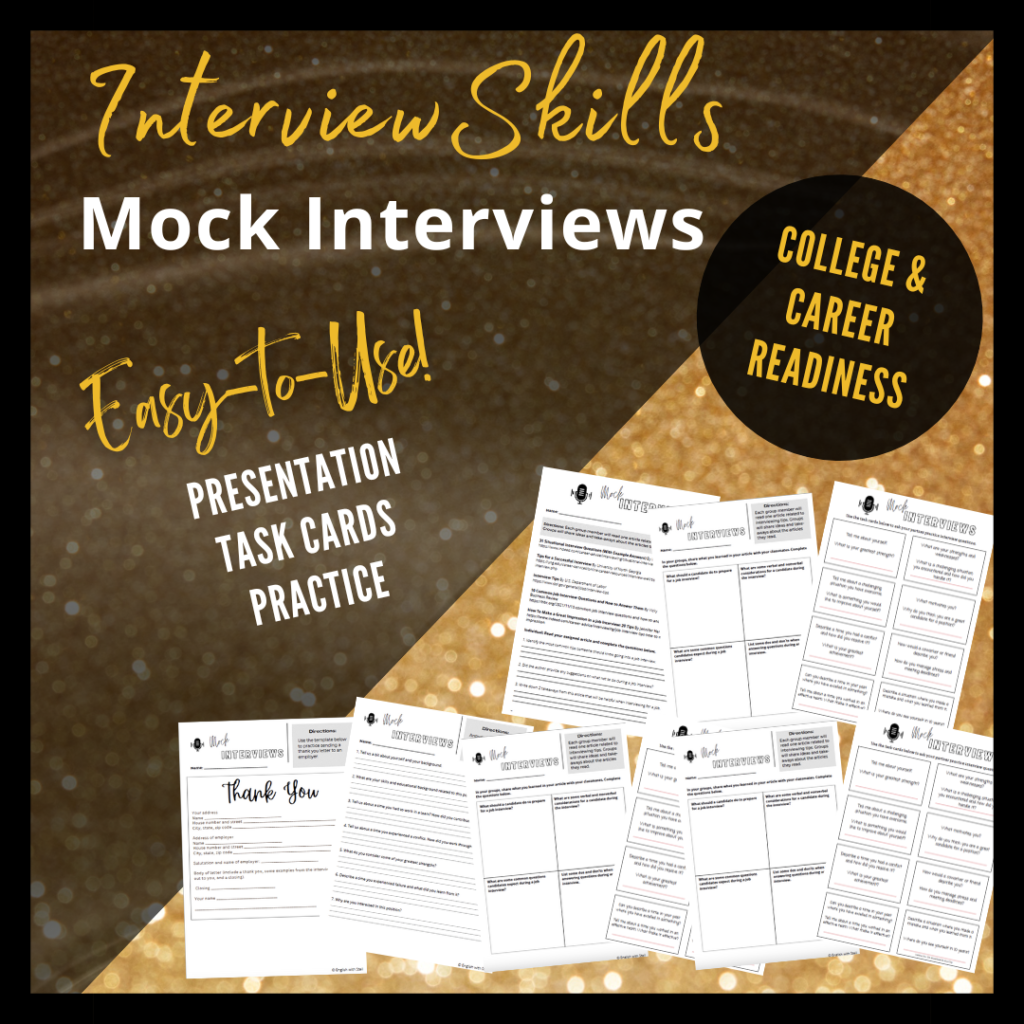
Additional Tips for Success
Interview Rubric: Develop a clear rubric to assess students’ performance during their mock interviews. Include categories such as clarity of answers, confidence, eye contact, and overall professionalism.
Peer Review: Incorporate peer review sessions where students can give and receive feedback from their classmates. This fosters a supportive learning environment and allows them to learn from each other’s experiences.
Real-World Insights: Invite guest speakers from various industries to talk about what they look for in candidates during interviews. This real-world perspective can provide valuable insights and tips.
Follow-Up: Encourage students to reflect on their mock interview experiences by writing a short essay or journal entry. What did they learn? What would they do differently next time? This reflection helps solidify their learning and prepares them for future interviews.
Conclusion
The mock interview unit stands as a testament to the power of experiential learning. By simulating real-world interview scenarios, students not only learn the theoretical aspects of successful interviewing but also apply these principles in practice. This hands-on approach, coupled with research and reflection activities, ensures that students walk away with a deep understanding of the interview process and the confidence to tackle real-world job interviews head-on.
In a world where first impressions can make or break job opportunities, empowering students with the skills to navigate interviews with confidence is invaluable. As educators, our role extends beyond imparting knowledge; it involves preparing our students for the challenges and opportunities of the future. With this comprehensive mock interview unit, we take a significant step toward achieving that goal, ensuring our students are not just ready to face interviews but to excel in them.

